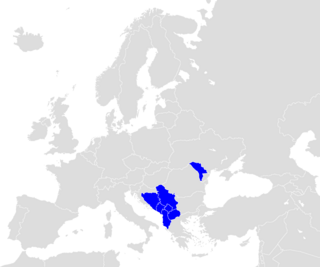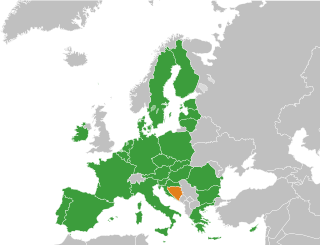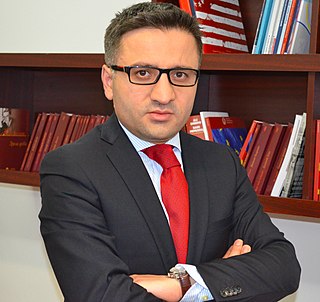The Joint Aviation Authorities (JAA) was an associated body of the European Civil Aviation Conference representing the civil aviation regulatory authorities of a number of European States who had agreed to co-operate in developing and implementing common safety regulatory standards and procedures. It was not a regulatory body, regulation being achieved through the member authorities. It was in existence from 1970 until disbanded in 2009. Its headquarters were located in Hoofddorp near Schiphol airport in Netherlands.

The Central European Free Trade Agreement (CEFTA) is an international trade agreement between countries mostly located in Southeastern Europe. Founded by representatives of Poland, Hungary and Czechoslovakia, CEFTA in 2006 expanded to Albania, Bosnia and Herzegovina, Bulgaria, Croatia, Moldova, Montenegro, North Macedonia, Romania, Serbia, Slovenia and the UNMIK.
Europe, the westernmost portion of Eurasia, is often divided into regions and subregions based on geographical, cultural or historical factors. Since there is no universal agreement on Europe's regional composition, the placement of individual countries may vary based on criteria being used. For instance, the Balkans is a distinct geographical region within Europe, but individual countries may alternatively be grouped into South-eastern Europe or Southern Europe.

Southeast Europe or Southeastern Europe (SEE) is a geographical sub-region of Europe, consisting primarily of the cultural region of the Balkans, as well as adjacent regions and archipelagos. There are overlapping and conflicting definitions of the region, due to political, economic, historical, cultural, and geographical considerations.

The Central European Initiative (CEI) is a forum of regional cooperation in Central and Eastern Europe, counting 18 member states. It was formed in Budapest in 1989. The body was developed on the basis of earlier experiences with The Alps-Adriatic Working Group. The CEI headquarters have been in Trieste, Italy, since 1996.

The Stability Pact for Southeastern Europe was an institution aimed at strengthening peace, democracy, human rights and economy in the countries of South Eastern Europe from 1999 to 2008. It was replaced by the Regional Cooperation Council (RCC) in February 2008. The RCC replaced it because it is more "regionally owned" than the Stability Pact, which was driven more by outside partners such as the EU.

The Energy Community, commonly referred to as the Energy Community for South East Europe (ECSEE), is an international organization consisting of the European Union (EU) and a number of non-EU countries. It aims to extend the EU internal energy market to wider Southeast Europe. The members commit to implement relevant EU energy acquis communautaire, to develop an adequate regulatory framework and to liberalize their energy markets in line with the acquis under the founding Treaty.

The Southeast European Cooperative Initiative (SECI) is a multilateral regional initiative that has been initiated by the European Union, the United States of America and the countries of Southeast Europe within the framework of the Organization for Security and Cooperation in Europe (OSCE) as a support to the implementation of the Dayton Accords in December 1996 at the inaugural session at Geneva on the basis of Final Points of Common EU-USA Understanding.

Albania is on the current agenda for future enlargement of the European Union (EU). It applied for EU membership on 28 April 2009, and has since June 2014 been an official candidate for accession. The Council of the European Union decided in March 2020 to open accession negotiations with Albania.

The accession of Bosnia and Herzegovina to the European Union (EU) is the stated aim of the present relations between the two entities. Bosnia and Herzegovina has been recognised by the European Union as a "candidate country" for accession since the decision of the European Council in 2022 and is on the current agenda for future enlargement of the EU. Bosnia and Herzegovina takes part in the Stabilisation and Association Process and trade relations are regulated by an Interim Agreement.
The Instrument for Pre-Accession Assistance, or simply IPA, is a funding mechanism of the European Union. As of 2007, it replaced previous programmes such as the PHARE, ISPA, SAPARD and CARDS. Unlike the previous assistance programs, IPA offers funds to both EU candidate countries and potential candidates.
As a member of FIFA and UEFA, the Montenegro national football team has been playing official matches since March 2007. Montenegro plays in the qualifiers for the FIFA World Cup and UEFA European Championship, as well as partaking in the UEFA Nations League. Apart from that, the team participates in friendly matches.
The European Regulators' Group for Electricity and Gas (ERGEG) was an advisory group to the European Commission on internal energy market issues in Europe. ERGEG was set up by the European Commission to assist the commission in consolidating a single EU market for electricity and gas. ERGEG's members were the heads of the national energy regulatory authorities in the EU's 28 Member States. It was dissolved in 2011 when Agency for the Cooperation of Energy Regulators (ACER) took over its responsibilities.

Fatmir Besimi is a Macedonian politician and economist of Albanian ethnicity. He currently served for Minister of Finance in North Macedonia, He also served twice as Minister of Economy then Minister of Defence and after that he was Deputy Prime Minister of the Government of the Republic of Macedonia in charge of European Affairs. In 2010 he was selected as one of the top European Ministers in the group of Young Global Leaders by World Economic Forum.

The Energy Regulators Regional Association (ERRA) is a voluntary organization of independent energy regulatory bodies primarily from the Central European and Eurasian region, with Affiliates from Africa, Asia the Middle East and the USA.

This list of the Albania national football team results from 2000 to 2019.

2016 Western Balkans Summit in Paris, France was third annual summit within the Berlin Process initiative for European integration of Western Balkans states. Previous summits took place in Berlin in 2014 and in Vienna in 2015. Heads of government, foreign ministers and the ministers of economy of Albania, Bosnia and Herzegovina, Kosovo, Republic of Macedonia, Montenegro, Serbia, as well as EU member states from the region Croatia, Slovenia and EU member states Austria, France, Germany, Italy as well as representatives of the European Union and the International Financial Institutions took part in Paris summit. Summit took place on 4 July 2016. Participants welcomed the intention of Italy to host the next summit in 2017.

Transport Community is an international organisation in the field of mobility and transport, consisting of 36 participants – the European Union member states represented by the European Commission, the six Western Balkans regional partners.

The Open Balkan is an economic and political zone of three member states in the Balkans, those being Albania, North Macedonia and Serbia. The zone has a total area of 131,935 km2 (50,940 sq mi) and an estimated total population of almost 12 million located in Central and Southern Europe. The official languages are Albanian, Macedonian and Serbian. Its administrative centres are the cities of Belgrade, Skopje and Tirana. With the establishment of the zone, all three member states aim to increase trade and cooperation as well as improve bilateral relations.














